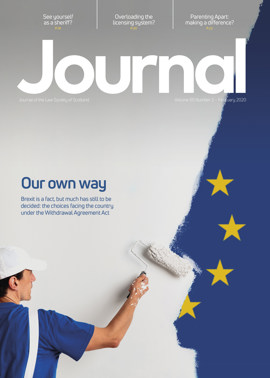Catalysts for change

I welcome the points raised by Chris Stuart [in this article] and share the sentiment that we should all be looking at ways to improve the way we do business. Registers of Scotland (RoS) cannot do this on our own. We need to work with representation from across the conveyancing sector to design the services that people expect to be able to use in the future.
Is there widespread and genuine desire for change? Are you prepared to share your energy, expertise and influence to help make the conveyancing process better? If the answer is “yes”, then you can count on us to be with you every step of the way. RoS will jointly host a conference later this year, entitled: “The Future of Conveyancing”. It will be an opportunity to share ideas and examples of innovation from across the conveyancing community, and start drawing the roadmap to a better system. We’ll reveal more details soon.
Track record
We’re happy to be catalysts for change. RoS has a track record of bringing our experience to the table and sharing resources for the common good. Meaningful, lasting change will only happen if the legal profession in Scotland grasps the opportunity, demonstrates flexibility and uses its collective power to make this happen.
Security of land ownership is essential to the success of a functioning property market. A healthy market is essential to a successful economy and society. RoS provides clarity and security in property ownership and interests which underpins the conveyancing sector. We enable property transactions to be registered safely, accurately and efficiently. This provides trust and confidence, supports the buying and selling process, and the economy generally.
RoS is guardian of historic registers, but we’re equally proud of our role as innovators. We’re committed to working with the professions to develop new products that deliver the best possible solution to our mutual customers. Successful digital innovations, such as ScotLIS and the Digital Discharge Service, are proof of that. Neither of them would have been possible without an approach that’s focused on designing with our customers. We’re grateful to solicitors and lenders who join our user experience panels and who welcome our research colleagues into their offices so we can see how they use our systems and where we could improve them.
Fruits of dialogue
You don’t have to look far from these borders to see other good examples of partnership working. The Home Buying & Selling Group was set up to find ways to make the process of home buying and selling in England & Wales cheaper, faster and less stressful. Its aim is to help the industry and government work together to achieve these aims and ensure all the different sectors required by individuals to buy and sell a home, make the process more seamless for consumers. The group is chaired by Kate Faulkner, one of the UK’s property experts. It’s an informal mix of consumer groups, property portals, regulators, redress schemes, trade and representative bodies and companies that help people to move on a daily basis. Its endeavours are beginning to make real improvements to the home buying and selling process in England & Wales.
We’d welcome the opportunity to be involved in any discussions or working parties that lead to even greater efficiencies in the conveyancing process in Scotland. That kind of dialogue and partnership working already takes place across many forums. For example, we engage regularly with the Law Society of Scotland and its members via scheduled partnership meetings; as part of the Property Law Committee; by engaging with faculties across Scotland; and at events such as the “A Future Focus” conferences we hosted in November and December, which were attended by hundreds of legal professionals.These sessions provide opportunities to share ideas, for us to learn from the people who use our services, and for all parties to develop ways of working even more closely with one another.
The Digital Registration Services Group has been operating for the last two years, and is hosted by RoS with membership from the Society’s Property Law Committee and lenders. It’s an opportunity to share updates on existing services and research into future services. Recently, colleagues within RoS shared work on the customer case activity underway in the areas in which we operate. Our hypothesis is that by joining together the pre-registration and registration actions carried out by our customers into a customer case, we can reduce the frustration felt by customers who have to re-key information, and provide a connected dataset that allows us to extend the service. This is allowing us to present customers with a dashboard of their active cases to track case progress. To verify this we are building a prototype which we’ll test with a sample set of customers. We are grateful to the solicitors and searchers working with us on this project.
In January we released the new sasine application form, following the new CAJR application form at the end of 2019. There are legislative limits to the changes we can make to these, but we’ve listened to feedback from our customers and have introduced improvements to make it quicker to complete, relying on more auto-population and validation.
We recognise the benefit of digital submission to the conveyancing community, which is why we sought the Registers of Scotland (Digital Registration, etc) Regulations 2018 that enable the submission of digital applications.
Digital standard securities?
Last year, we investigated the desire for a digital standard security service within the community, creating a prototype to use in research sessions with firms of various sizes, lenders and the Society. While response to the concept was broadly positive, the element of signing the security deed (which is required for the registration of the application) proved a blocker. The successful delivery of a digital service means that it should make an existing process more straightforward, whereas our research with firms told us that many would find it onerous, or simply not viable, to request their client to sign a power of attorney to enable the firm to sign the document on their behalf. This arises because the borrower would need a digital signature, to the qualified electronic standard in order to sign the deed. Therefore RoS has paused this activity rather than continue with a solution that requires the solicitor to sign, using their Law Society of Scotland or RoS-issued smartcard.
We have our own ideas about the future of conveyancing, but we’d be delighted to hear from you too. If you share our desire for change, please join the conversation that will lead to positive action.







